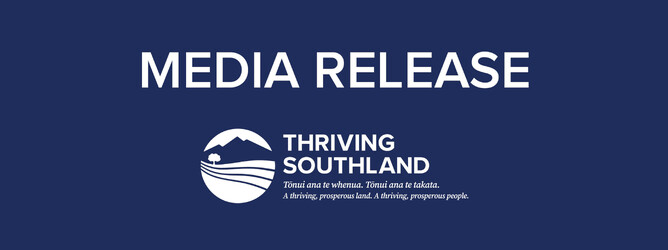Independent research commissioned by Thriving Southland has revealed the critical success factors that enable catchment groups to build strong community participation and achieve tangible environmental improvements.
The study, conducted by Scarlatti in March 2025, examined four successful Southland catchment group projects: Understanding your Landscape's Resilience (Mataura Catchment Group), Targeted Solutions to Balfour's Environmental Challenges (Balfour Catchment Group), Understanding the movement of nutrients (Edendale Aquifer Group), and Carbon Neutral Dipton (Greater Dipton Catchment Group).
Richard Kyte, Thriving Southland General Manager said, “by listening to those on the ground, we wanted to document and collate the tangible actions that our Catchment Groups use, to achieve great outcomes. Taking this knowledge and learning from what the groups have done to help understand some of the keys to success. And, although the results may seem like common sense, they are actually gems”.
Talking with the farmer and project leaders as to the main factors in delivering Catchment Group project success, highlighted that community ownership is non-negotiable. The research found that the most successful projects were driven from the ground up, with farmers firmly in the driver's seat. "Once you lose the farmers' trust, you lose the project," noted one project participant. External organisations achieved the greatest impact when they enabled and empowered communities rather than trying to lead.
Science must be locally relevant and participatory. Farmers valued data collected from their own land and systems over broad assumptions. The Balfour project achieved 100% engagement partly because farmers were involved in data collection, not just as recipients of information. "If you jump that first phase of science, it won't happen. You may get that handful of farmers who are always going to be on board, but you won't get the wider community," explained a Balfour project participant.
Richard also comments that it’s not surprising that time and patience are essential investments. “The research revealed that meaningful engagement takes years to develop. For example, the Balfour project's formal establishment in 2020 built on conversations that began nearly 20 years earlier”. Success came from "slowly chipping away at it, inviting people to get involved all through the journey."
The research also identified several other practical insights for Catchment Groups:
Start with willing participants but don't abandon those who need more time
Keep farmers at the centre of decision-making as projects grow and attract external support
Invest in the right people - particularly catchment coordinators who are trusted by the community and skilled at facilitation
Make science hands-on with farmers involved in data collection and solution development
Plan for extension early to spread impact beyond the core group
The research also highlighted barriers that successful groups face, particularly regulatory hurdles that can delay or prevent environmental improvements.
"This research confirms what we've observed across our network," said Richard. "When communities are empowered to lead with solutions that work for their land and water, supported by credible science and the right people, they can achieve remarkable environmental outcomes. The key is patience, trust, and keeping farmers at the heart of the process."
Ends
About the Research
The study involved 11 interviews with farmers and rural professionals conducted between February and March 2025. The research was designed to document engagement processes and identify steps that led to stronger community participation and meaningful catchment projects.
Resources Available
Detailed research report
Infographics for catchment groups planning similar projects
Guidance materials for stakeholders working with catchment groups
Media Contact: Lee Cowan, Thriving Southland Communications Manager
021930836, lee@thrivingsouthland.co.nz
About Thriving Southland: Thriving Southland supports Southland’s Catchment Groups working to improve water quality and environmental outcomes across Southland. The charity supports community-led initiatives by providing coordination, capability building, and research and science, helping farmers and rural communities implement practical solutions for sustainable land management.
Note to editors: Richard Kyte is available for interviews. High-resolution images from field days and project activities are available upon request.

